
Home - Search - Browse - Alphabetic Index: 0- 1- 2- 3- 4- 5- 6- 7- 8- 9
A- B- C- D- E- F- G- H- I- J- K- L- M- N- O- P- Q- R- S- T- U- V- W- X- Y- Z
STS-41-D

STS-41-D
View of launch of orbiter Discovery on 41-D mission
Credit: NASA
AKA: Discovery. Launched: 1984-08-30. Returned: 1984-09-05. Number crew: 6 . Duration: 6.04 days.
Payloads: Satellite Business System (SBS)-D communications satellite with Payload Assist Module (PAM)-D deployment, Syncom IV-2 communications satellite with its unique stage deployment, Telstar (American Telephone and Telegraph) 3-C with PAM-D deployment, Office of Aeronautics and Space Technology (OAST)-1 experiments. Deployment and restowing of large solar array. Continuous Flow Electrophoresis (CFES). IMAX camera.
Orbits of Earth: 96. Distance traveled: 4,007,266 km. Orbiter Liftoff Mass: 119,511 kg. Orbiter Mass at Landing: 91,476 kg. Payload to Orbit: 21,552 kg. Payload Returned: 5,123 kg. Landed at: Runway 17 dry lake bed at Edwards Air Force Base, . Landing Speed: 370 kph. Touchdown miss distance: 765 m. Landing Rollout: 3,131 m. A student experiment, sponsored by Rockwell International, of indium crystal growth using the float zone technique was successful, although a blown fuse resulted in a premature shutdown.
NASA Official Mission Narrative
Mission Name: 41-D (12)
DISCOVERY (1)
Pad 39-A (24)
12th Shuttle Mission
1st Flight OV-103
RSLS Abort after SSME Ignition (1)
2nd Rollback
Crew:
Henry W. Hartsfield (2), Jr., Commander
Michael L. Coats (1), Pilot
Judith A. Resnik (1), Mission Specialist 1
Steven A. Hawley (1), Mission Specialist 2
Richard M. Mullane (1), Mission Specialist 3
Charles D. Walker (1), Payload Specialist 1
Milestones:
OPF-Nov. 10,1983
VAB-Dec. 9,1983
(storage)
Flow A:
OPF - Jan. 10, 1984
VAB - May 12,1984
PAD - May 19,1984
Flow B (rollback):
VAB - July 14, 1984
OPF - July 17,1984
VAB - Aug. 1,1984
PAD - Aug. 9, 1984
Payload:
SBS-D,TELSTAR-3C,LEASAT-1,OAST-1,CFES(5),RME(3),SSIP(x1),CLOUDS,
IMAX-CAMERA(2)
Mission Objectives:
Launch:
August 30, 1984, 8:41:50 a.m, EDT. Launch attempt June 25 scrubbed during T-9 minute hold due to failure of orbiter's back-up general purpose computer (GPC). Launch attempt June 26 aborted at T-4 seconds when GPC detected anomaly in orbiter's number three main engine. Discovery returned to OPF and number three main engine replaced. (To preserve launch schedule of future missions, 41-D cargo remanifested to include payload elements from both 41-D and 41-F flights; 41-F mission cancelled.) Shuttle restacked and returned to pad. Third launch attempt Aug. 29 delayed when discrepancy noted in flight software of Discovery's master events controller relating to solid rocket booster fire commands. A software patch was verified and implemented to assure all three booster fire commands were issued in the proper time interval. Launch Aug. 30 delayed six minutes, 50 seconds when private aircraft intruded into warning area off coast of Cape Canaveral. Launch Weight: 263,477 lbs.
Orbit:
Altitude: 184nm
Inclination: 28.5 degrees
Orbits: 97
Duration: Six days, zero hours, 56 minutes, four seconds.
Distance: 2,490,000 miles
Hardware:
SRB: BI-011
SRM: 013LW(HPM)
ET : 13/LWT-6
MLP : 2
SSME-1: SN-2109
SSME-2: SN-2018
SSME-3: SN-2021
Landing:
September 5, 1984, 8:37:54 s.m. PDT, Runway 17, Edwards Air Force Base, Calif. Rollout distance: 10,275 feet. Rollout time:60 seconds. Landing planned for Edwards desert runway because it was Discovery's first flight. Orbiter returned to KSC Sept. 10, 1984. Landing Weight: 201,674 lbs.
Mission Highlights:
Three satellites deployed: Satellite Business System SBS-D, SYNCOM IV-2 (also known as LEASAT2) and TELSTAR. The 102- foot-tall, 13-loot-wide Office of Application and Space Technology (OAST-1) solar wing extended from payload bay. Wing carried different types of solar cells and extended to full height several times. It demonstrated large lightweight solar arrays for future in building large facilities in space such as Space Station. Other payloads: Continuous Flow Electrophoresis System (CFES) Ill; Radiation Monitoring Equipment (RME); Shuttle Student Involvement Program (SSIP) experiment; lMAX camera, being flown second time; and an Air Force experiment, Cloud Logic to Optimize Use of Defense Systems (CLOUDS).
More at: STS-41-D.
Family: Manned spaceflight. People: Coats, Hartsfield, Hawley, Mullane, Resnik, Walker. Country: USA. Spacecraft: Discovery. Projects: STS. Launch Sites: Cape Canaveral. Agency: NASA, NASA Houston. Bibliography: 4457.
 | STS-41-D Credit: www.spacefacts.de |
 | STS-41-D View of foot restraint strayed from Discovery Credit: NASA |
 | STS-41-D Payload specialist Charles Walker works with CFES experiment Credit: NASA |
 | STS-41-D Mission specialist Judith Resnik at interdeck access hatch Credit: NASA |
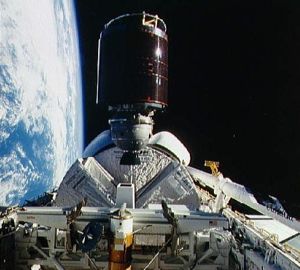 | STS-41-D Deployment of the SBS-4 communications satellite Credit: NASA |
 | STS-41-D View of the SBS-4 communications satellite in orbit above the earth Credit: NASA |
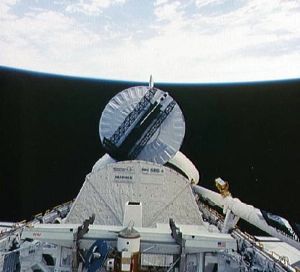 | STS-41-D Deployment of the Syncom IV (Leasat-2) satellite Credit: NASA |
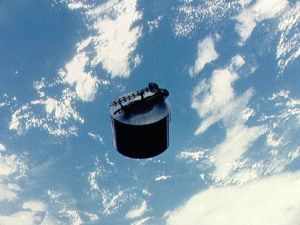 | STS-41-D View of the Syncom IV satellite in orbit over the earth Credit: NASA |
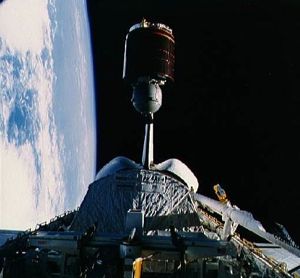 | STS-41-D Deployment of the Telstar communications satellite Credit: NASA |
 | STS-41-D View of Mission Specialist Judith Resnik on the middeck Credit: NASA |
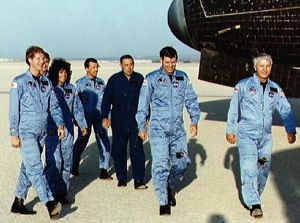 | STS-41-D Crew of STS 41-D makes a visual post-flight inspection of orbiter Credit: NASA |
1984 June 26 - . Launch Site: Cape Canaveral. Launch Complex: Cape Canaveral LC39A. LV Family: Shuttle. Launch Vehicle: Space Shuttle.
- Shuttle Discovery Pad Abort - . Nation: USA. Program: STS. Flight: STS-41-D. Spacecraft Bus: Shuttle. Spacecraft: Discovery. The countdown for the second launch attempt for Discovery's maiden flight ended at T- 4 seconds when the orbiter's computers detected a sluggish valve in main engine #3. The main engine was replaced and Discovery was finally launched on August 30, 1984..
1984 August 30 - . 12:41 GMT - . Launch Site: Cape Canaveral. Launch Complex: Cape Canaveral LC39A. Launch Platform: MLP2. LV Family: Shuttle. Launch Vehicle: Space Shuttle.
- STS-41-D - .
Call Sign: Discovery. Crew: Coats,
Hartsfield,
Hawley,
Mullane,
Resnik,
Walker.
Payload: Discovery F01 / SBS 4[PAM-D] / Telstar 302[PAM-D]. Mass: 21,552 kg (47,514 lb). Nation: USA.
Related Persons: Coats,
Hartsfield,
Hawley,
Mullane,
Resnik,
Walker.
Agency: NASA Houston.
Program: STS.
Class: Manned.
Type: Manned spaceplane. Flight: STS-41-D.
Spacecraft Bus: Shuttle.
Spacecraft: Discovery.
Duration: 6.04 days. Decay Date: 1984-09-05 . USAF Sat Cat: 15234 . COSPAR: 1984-093A. Apogee: 307 km (190 mi). Perigee: 300 km (180 mi). Inclination: 28.50 deg. Period: 90.60 min.
Manned six crew. First flight of space shuttle Discovery; deployed SBS 4, Leasat 1, Telstar 3C. Payloads: Satellite Business System (SBS)-D commu-nications satellite with Payload Assist Module (PAM)-D deployment, Syncom IV-2 communica-tions satellite with its unique stage deployment, Telstar (American Telephone and Telegraph) 3-C with PAM-D deployment, Office of Aeronautics and Space Technology (OAST)-1 experiments. Deployment and restowing of large solar array. Continuous Flow Electrophoresis (CFES). IMAX camera.
1984 August 31 - .
- STS-41-D - Wakeup Song: Anchors Aweigh - . Flight: STS-41-D. "Anchors Aweigh".
1984 September 5 - .
- Landing of STS-41-D - . Return Crew: Coats, Hartsfield, Hawley, Mullane, Resnik, Walker. Nation: USA. Related Persons: Coats, Hartsfield, Hawley, Mullane, Resnik, Walker. Program: STS. Flight: STS-41-D. STS-41-D landed at 13:39 GMT. .
Back to top of page
Home - Search - Browse - Alphabetic Index: 0- 1- 2- 3- 4- 5- 6- 7- 8- 9
A- B- C- D- E- F- G- H- I- J- K- L- M- N- O- P- Q- R- S- T- U- V- W- X- Y- Z
© 1997-2019 Mark Wade - Contact
© / Conditions for Use